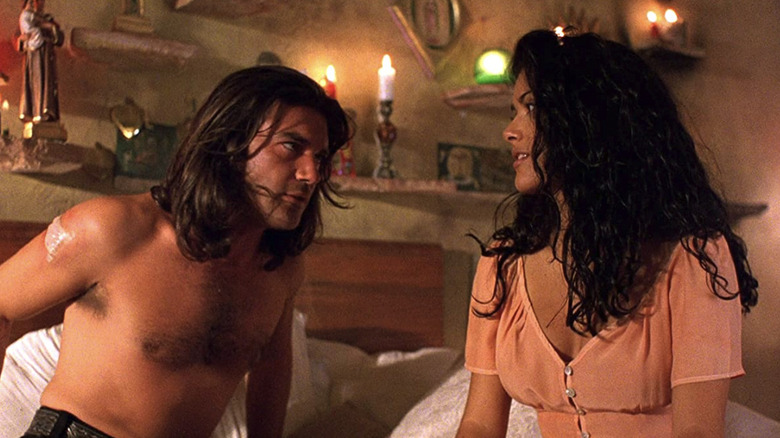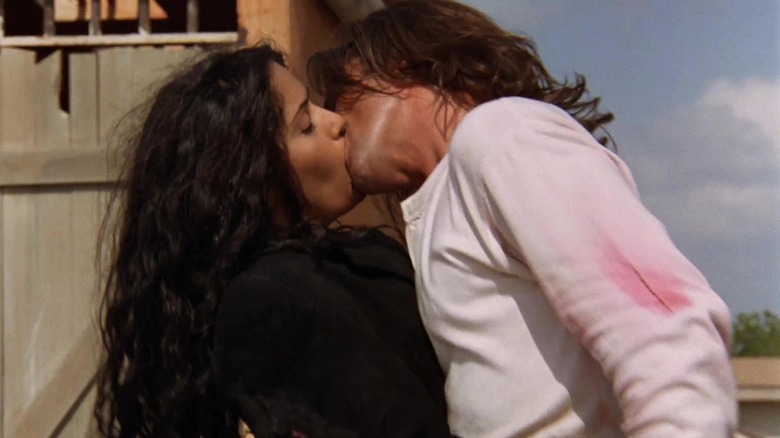Desperado's Love Scene Was Hard For Salma Hayek To Handle
The story behind the 1995 film "Desperado" is as interesting as the film itself. In 1991, 23-year-old Robert Rodriguez wrote and directed his first feature film, the Spanish-language Western action/thriller "El Mariachi," on a shoestring budget of around $7,000. The movie, about a mariachi who turns into a vigilante after being mistaken for a criminal, caught the attention of Columbia Pictures, who signed Rodriguez to direct the film's sequel, "Desperado." It was the second of the filmmaker's "Mexico trilogy" (the third being 2003's "Once Upon a Time in Mexico").
"Desperado" allowed Rodriguez to showcase his talents with the financial support of a big studio, and he delivered. Roger Ebert called the sequel a curtain call for Rodriguez and praised the film's "set-ups, camera angles, lighting effects, editing rhythms and the fanciful staging of action scenes." Like Ebert, The New York Times was equally impressed with the substance of what they saw on screen from the budding filmmaker, proclaiming "Mr. Rodriguez may be good enough to make a film about anything."
"Desperado" wasn't only a mainstream introduction for Rodriguez. The cast of the film was upgraded from the mostly amateurs in "El Mariachi," with Antonio Banderas taking over the lead role of the guitar-playing hero. Banderas's co-star and love interest was a relatively unknown actress by the name of Salma Hayek. And while the film put Hayek on the map, a steamy love scene almost got her fired before she got her big break.
Hayek didn't know about the love scene
Salma Hayek was one of Mexico's biggest telenovela stars when she left Mexico in 1991 for Hollywood. Four years later, she got her big break in "Desperado." In the movie Hayek plays Carolina, a strong, gun-wielding bookstore owner who falls in love with El Mariachi (Banderas) and helps him battle a local drug lord. It was a breakout role for Hayek, though she doesn't always remember the role fondly.
As Hayek explained to the Armchair Expert podcast, she wasn't aware of a graphic, full-frontal love scene with Antonio Banderas when she signed on for the film. But because she was familiar with Robert Rodriguez and trusted him and his then-wife and co-producer, Hayek agreed to do the love scene on a closed set.
Hayek told O Magazine that she cried throughout the scene because she didn't want to be naked on camera. "I'm crying most of the time, so they have to take little pieces," Hayek said of the editing process to achieve the final scene. "It took eight hours [to shoot] instead of an hour. I nearly got fired."
Hayek said the biggest struggle was thinking of her father and brother watching the movie, which would take her out of character when trying to film the scene. But she made it through the production, and when "Desperado" was finally released, Hayek became an overnight success. However, the actress didn't see it that way at first. In fact, because of a small language barrier, she thought the movie was a disaster.
From bombing to bombshell
"Desperado" grossed nearly $8 million on its opening weekend and was widely praised for its bold style and action sequences. The movie also introduced American audiences to Hayek, turning her into a Hollywood bombshell overnight. "Then I became a sex symbol. Now, how the hell did that happen?" Hayek said. "I don't exactly know the moment when it happened, but all of a sudden, I'm a bombshell. The way I discovered this was I did 'Desperado.'"
But at the time, Hayek was confused by the term bombshell, thinking it meant that people hated the movie and her performance. Hayek remembered:
"And then when the movie comes out, I read the first review. What do they say about me? 'Salma Hayek is a bombshell.' I had heard that when a movie does badly here, they say it bombs. So I'm crying. I think they're saying, 'That terrible actress! It's a bomb! Salma Hayek is the worst part of the movie!'"
Hayek would come to resent the bombshell label, saying that directors expected her to play "dumb and sexy" characters. In 1999, she founded her own production company, Ventanarosa Productions, to create projects for Latin women that break Hollywood stereotypes. In 2002, the company produced "Frida," in which Hayek was nominated for an Academy Award for Best Actress in a Leading Role for her performance as artist Frida Kahlo. It was an impressive, empowering leap for the actress who, years before, found herself crying on the set of her breakout film.


